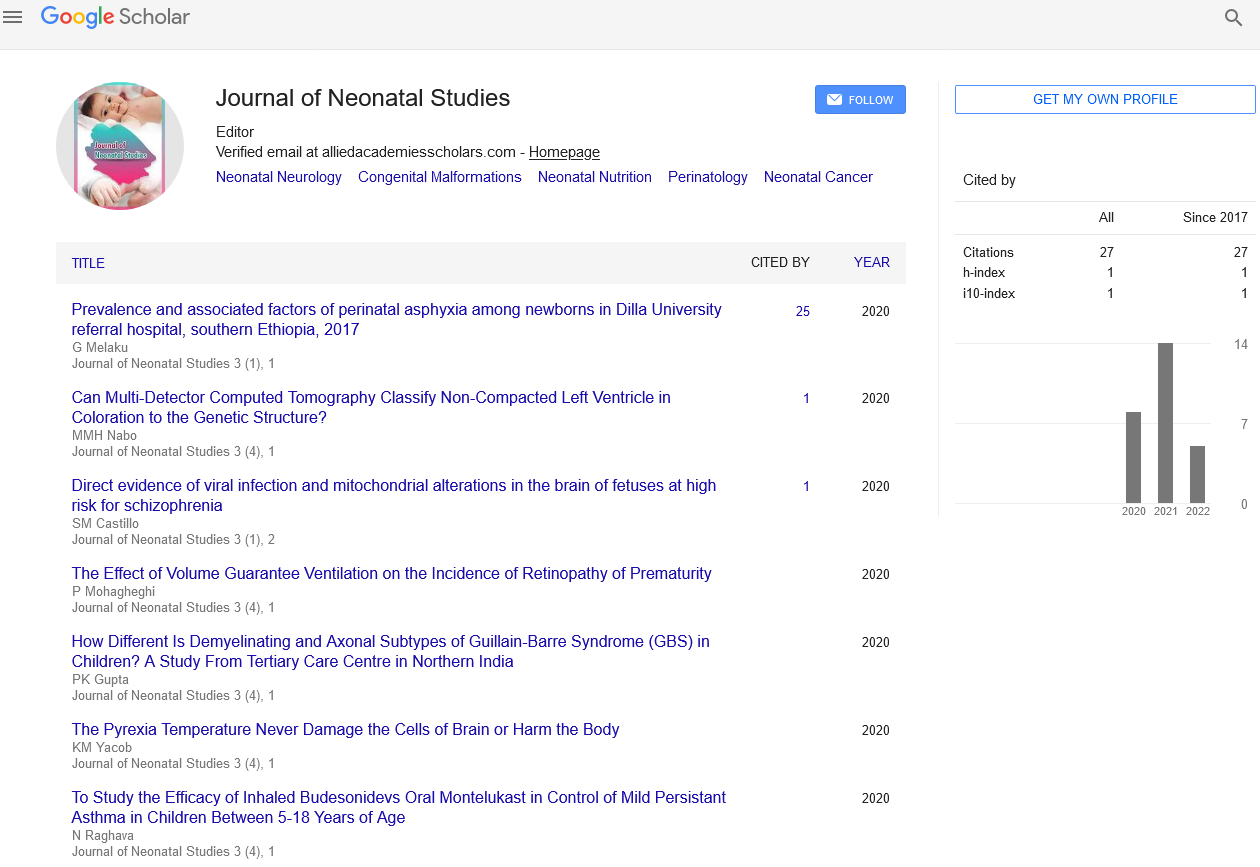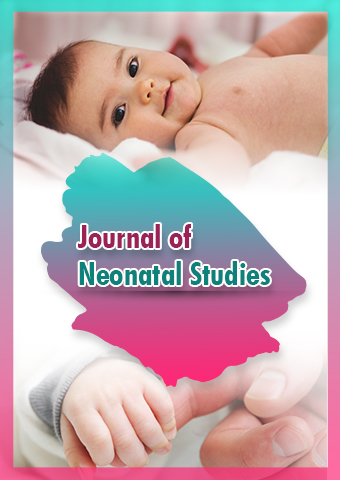Commentary - Journal of Neonatal Studies (2023) Volume 6, Issue 6
Pioneering Perinatology: Innovations for Healthier Pregnancies
- Corresponding Author:
- Oliver Schulze
Department of Pediatrics, Heidelberg University, Heidelberg, Germany
E-mail: oli_ze@uk.d
Received: 10-Nov-2023, Manuscript No. JNS-23-121521; Editor assigned: 13-Nov-2023, PreQC No. JNS-23-121521 (PQ); Reviewed: 27-Nov-2023, QC No. JNS-23-121521; Revised: 08-Dec-2023, Manuscript No. JNS-23-121521 (R); Published: 18-Dec- 2023, DOI: 10.37532/JNS.2023.6(6).166-167
Description
Certainly! Perinatology, also known as maternal-fetal medicine, is a medical specialty that focuses on the care of pregnant women and their unborn babies. The term “perinatology” is derived from the Greek words “peri,” meaning around, and “natal,” relating to birth. Therefore, perinatology encompasses the period around the time of birth, including pregnancy, childbirth, and the postpartum period.
Key aspects of perinatology include
High-risk pregnancy management: Perinatologists specialize in managing high-risk pregnancies, where there is an increased likelihood of complications for either the mother, the baby, or both. This can include pregnancies in women with pre-existing medical conditions (such as diabetes or hypertension) or those with complications that arise during pregnancy.
Advanced diagnostic techniques: Perinatologists use advanced diagnostic tools and techniques to assess the health of the fetus. This may involve detailed ultrasound examinations, genetic testing, and other specialized tests to identify and monitor potential issues.
Collaboration with obstetricians: Perinatologists work closely with obstetricians (doctors who specialize in pregnancy and childbirth) and other healthcare professionals to provide comprehensive care. They collaborate to develop and implement treatment plans tailored to the specific needs of each patient.
Fetal intervention: In some cases, perinatologists may perform interventions to address issues affecting the fetus while still in the womb. This could include procedures to treat certain birth defects or medical conditions before birth.
Counseling and support: Perinatologists play a crucial role in counseling and supporting expectant mothers and their families. They provide information about potential risks and help families make informed decisions about their pregnancy and childbirth.
Postpartum care: Perinatologists are involved in the care of both the mother and the newborn during the postpartum period. This may include monitoring for any complications that could arise after delivery.
It’s important to clarify that perinatology is not a condition or disease that can be “cured.” Perinatology is a medical specialty focused on managing and addressing complications that may arise during pregnancy, childbirth, and the postpartum period. If you are facing challenges during pregnancy or have concerns about your health or the health of your baby, it’s crucial to consult with healthcare professionals, including perinatologists, obstetricians, and other specialists.
The approach to managing perinatal issues depends on the specific conditions or complications involved. Common interventions and treatments may include
Monitoring and surveillance: Perinatologists closely monitor the health of both the mother and the fetus throughout pregnancy. Regular check-ups, ultrasound examinations, and other diagnostic tests help identify and address potential issues.
Medical management: In cases where the mother has pre-existing medical conditions, such as diabetes or hypertension, perinatologists may work with other healthcare providers to manage these conditions during pregnancy.
Medications: Some conditions may be treated with medications to help control symptoms or prevent complications. It’s essential that any medications used during pregnancy are safe for both the mother and the developing fetus.
Fetal interventions: In certain situations, perinatologists may perform fetal interventions to address specific issues affecting the baby while still in the womb. This could involve procedures to treat certain birth defects or conditions.
Preventive measures: Perinatologists often provide guidance on lifestyle changes, dietary recommendations, and other preventive measures to reduce the risk of complications.
Collaboration with specialists: Perinatologists work closely with other specialists, such as genetic counselors, neonatologists, and pediatric surgeons, to provide comprehensive care when needed.
It’s important to note that the management of perinatal issues is highly individualized, and the appropriate course of action depends on the specific circumstances of each pregnancy. If you or someone you know is facing challenges during pregnancy, it’s crucial to seek timely and appropriate medical care. Early detection and intervention can significantly improve outcomes for both the mother and the baby. Always consult with healthcare professionals for personalized advice and guidance based on your specific situation.
Perinatology, as a medical specialty, is not something that directly affects the birth of a child. Instead, perinatologists specialize in managing and addressing complications that may arise during pregnancy, with the goal of ensuring the best possible outcomes for both the mother and the baby. Their expertise is particularly valuable in high-risk pregnancies where there may be increased chances of complications.
The impact on the birth of a child depends on the specific conditions or complications involved in the pregnancy. Perinatologists work to identify and manage factors that could affect the health of the mother or the developing fetus. By monitoring the pregnancy closely and implementing appropriate interventions, perinatologists aim to reduce the risk of complications during childbirth and the postpartum period.
Common conditions that perinatologists may address include gestational diabetes, preeclampsia, multiple pregnancies (such as twins or triplets), fetal anomalies, and other medical issues that may arise during pregnancy.
It’s important for expectant mothers to receive proper prenatal care and, if necessary, consultation with a perinatologist to address any potential risks or complications. This collaborative approach involving obstetricians, perinatologists, and other healthcare professionals help ensure a comprehensive and well-coordinated care plan, promoting the health and well-being of both the mother and the baby.
If you have specific concerns about a pregnancy or childbirth, it’s crucial to discuss them with your healthcare provider, who can provide personalized guidance based on your individual circumstances.
Overall, perinatology aims to ensure the best possible outcomes for both the mother and the baby, particularly in situations where there are increased risks or complexities involved in the pregnancy. The field combines expertise in obstetrics, maternal-fetal medicine, and neonatology to provide comprehensive care throughout the perinatal period.

